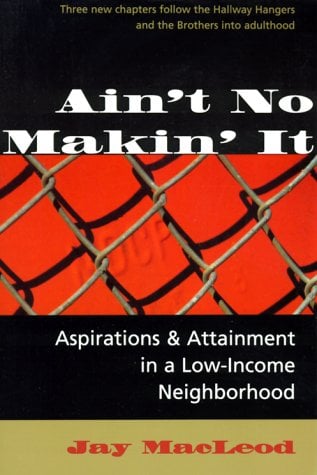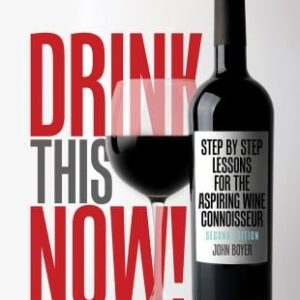Ain’t No Makin’ It : Aspirations and Attainment in a Low-Income Neighborhood by Jay MacLeod
$3.98
“I ain’t goin’ to college. Who wants to go to college? I’d just end up gettin’ a shitty job anyway.” So said Freddie Piniella, an eleven-year-old boy from Clarendon Heights low-income housing project, to Jay MacLeod, his counselor in a youth program. MacLeod was struck by the seeming self-defeatism of Freddie and his friends. How is it that in America, a nation of dreams and opportunities, a boy of eleven can feel trapped in a position of inherited poverty?The author immersed himself in the teenage underworld of Clarendon Heights. The Hallway Hangers, one of the neighborhood cliques, appear as cynical self-destructive hoodlums. The other group, the Brothers, take the American Dream to heart and aspire to middle-class respectability. The twist is that the Hallway Hangers are mostly white; the Brothers are almost all black. Comparing the two groups, MacLeod provides a provocative account of how poverty is perpetuated from one generation to the next.Part One tells the story of the boys’ teenage aspirations. Part Two follows the Hallway Hangers and the Brothers into adulthood. Eight years later the author returns to Clarendon Heights to find the members of both gangs struggling in the labor market or on the streets. Caught in the web of urban industrial decline, the Hallway Hangers–undereducated, unemployed, or imprisoned–have turned to the underground economy. But “cocaine capitalism” only fuels their desperation, and the Hallway Hangers seek solace in sexism and racism. The ambitious Brothers have fared little better. Their teenage dreams in tatters, the Brothers demonstrate that racism takes its toll on optimistic aspirations.This edition retains the vivid accounts of friendships, families, school, and work that made the first edition so popular. The ethnography resonates with feeling and vivid dialogue. But the book also addresses one of the most important issues in modern social theory and policy: how social inequality is reproduced from one generation to the next. MacLeod links individual lives with social theory to forge a powerful argument about how inequality is created, sustained, and accepted in the United States.
You must be logged in to post a comment.






Reviews
There are no reviews yet.